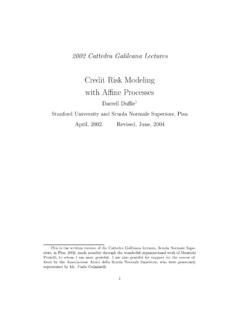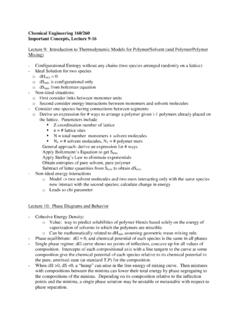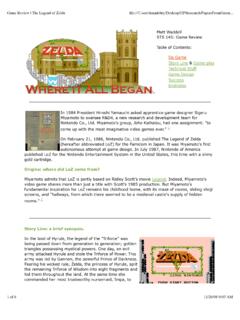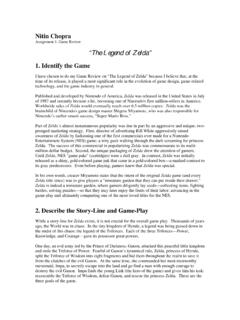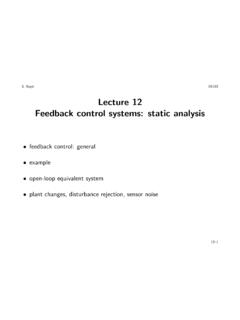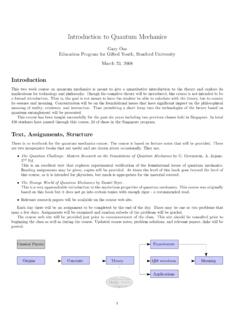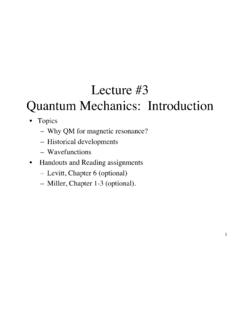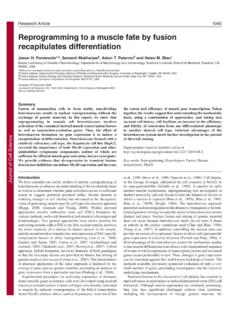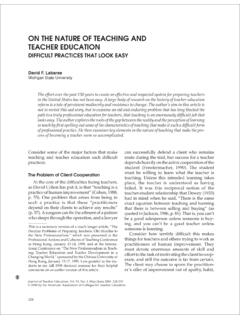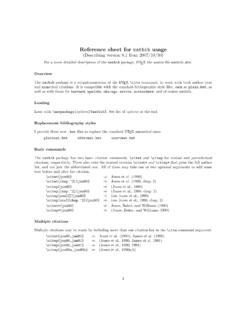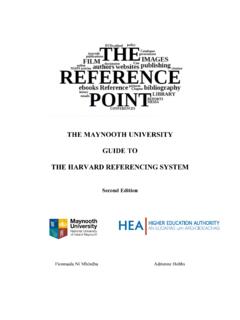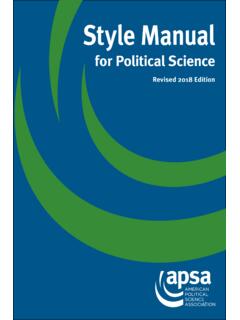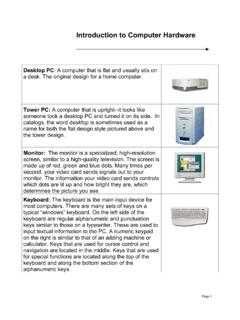Transcription of C++ Strings - Stanford University
1 CS106B Handout 08 Autumn 2012 September 28th, 2012 C++ Strings Original handout written by Neal Kanodia and Steve Jacobson. C++ Strings One of the most useful data types supplied in the C++ libraries is the string. A string is a variable that stores a sequence of letters or other characters, such as "Hello" or "May 10th is my birthday!". Just like the other data types, to create a string we first declare it, then we can store a value in it. string testString; testString = "This is a string."; We can combine these two statements into one line: string testString = "This is a string."; Often, we use Strings as output, and cout works exactly like one would expect: cout << testString << endl; will print the same result as cout << "This is a string.
2 " << endl; In order to use the string data type, the C++ string header <string> must be included at the top of the program. Also, you ll need to include using namespace std; to make the short name string visible instead of requiring the cumbersome std::string. (As a side note, std is a C++ namespace for many pieces of functionality that are provided in standard C++ libraries. For the purposes of this class, you won't need to otherwise know about namespaces.) Thus, you would have the following #include's in your program in order to use the string type. #include <string> using namespace std; Basic Operations Let s go into specifics about the string manipulations you ll be doing the most.
3 Counting the number of characters in a string. The length method returns the number of characters in a string, including spaces and punctuation . Like many of the string operations, length is a member function, and we invoke member functions using dot notation. The string that is the receiver is to the left of the dot, the member function we are invoking is to the right, ( ()). In such an expression, we are requesting the length from the variable str. 2 example program: #include <string> #include <iostream> using namespace std; #include " " int main() { string small, large; small = "I am short"; large = "I, friend, am a long and elaborate string indeed"; cout << "The short string is " << () << " characters.}
4 " << endl; cout << The long string is " << () << " characters." << endl; return 0; } output: The short string is 10 characters. The long string is 48 characters. Accessing individual characters. Using square brackets, you can access individual characters within a string as if it s a char array. Positions within a string str are numbered from 0 through () - 1. You can read and write to characters within a string using []. example program: #include <string> #include <iostream> using namespace std; #include " " int main() { string test; test = "I am Q the omnipot3nt"; char ch = test[5]; // ch is 'Q' test[18] = 'e'; // we correct misspelling of omnipotent cout << test << endl; cout << "ch = " << ch << endl; return 0; } output: I am Q the omnipotent ch = Q Be careful not to access positions outside the bounds of the string.
5 The square bracket operator is not range-checked and thus reading from or writing to an out-of-bounds index tends to produce difficult-to-track-down errors. There is an alternate member function 3 at(int index) that retrieves the character at a position with the benefit of built-in range-checking, but it s used much less often. Passing, returning, assigning Strings . C++ Strings are designed to behave like ordinary primitive types with regard to assignment. Assigning one string to another makes a deep copy of the character sequence. string str1 = "hello"; string str2 = str1; // makes a new copy str1[0] = 'y'; // changes str1, but not str2 Passing and returning Strings from functions clones the string.
6 If you change a string parameter within a function, changes are not seen in the calling function unless you have specifically passed the string by reference ( using that & trick we learned about in the Queen Safety example.) Comparing two Strings . You can compare two Strings for equality using the == and != operators. Suppose you ask the user for his or her name. If the user is Julie, the program prints a warm welcome. If the user is not Neal, the program prints the normal message. if the user is Neal, it prints a less enthusiastic response. example program: #include <string> #include <iostream> using namespace std; #include " " #include " " int main() { string myName = "Neal"; while (true) { cout << "Enter your name (or 'quit' to exit): "; string userName = getLine(); if (userName == "Julie") { cout << "Hi, Julie!}}}
7 Welcome back!" << endl; } else if (userName == "quit") { // user is sick of entering names, so let's quit cout << endl; break; } else if (userName != myName) { // user did not enter quit, Julie, or Neal cout << "Hello, " << userName << endl; } else { cout << "Oh, it s you, " << myName << endl; } } return 0; } 4 output: Enter your name (or 'quit' to exit): Neal Oh, it's you, Neal Enter your name (or 'quit' to exit): Julie Hi, Julie! Welcome back! Enter your name (or 'quit' to exit): Leland Hello, Leland Enter your name (or 'quit' to exit): quit You can use <, <=, >, and >= to compare Strings as well.
8 These operators compare Strings lexicographically, character by character and are case-sensitive. The following comparisons all evaluate to true: "A" < "B", "App" < "Apple", "help" > "hello", "Apple" < "apple". The last one might be a bit confusing, but the ASCII value for 'A' is 65, and comes before 'a', whose ASCII value is 97. So "Apple" comes before "apple" (or, for that matter, any other word that starts with a lower-case letter). Appending to a string: C++ Strings are wondrous things. Suppose you have two Strings , s1 and s2 and you want to create a new string of their concatenation. Conveniently, you can just write s1 + s2, and you ll get the result you d expect.
9 Similarly, if you want to append to the end of string, you can use the += operator. You can append either another string or a single character to the end of a string. example program: #include <string> #include <iostream> using namespace std; #include " " int main() { string firstname = "Leland"; string lastname = " Stanford "; string fullname = firstname + lastname; // concat the two Strings fullname += ", Jr"; // append another string fullname += '.'; // append a single char cout << firstname << lastname << endl; cout << fullname << endl; return 0; } output: Leland Stanford Leland Stanford , Jr.
10 5 More (Less Used) Operations The string class has many more operations; we ll show just a few of the more useful ones below. Searching within a string. The string member function find is used to search within a string for a particular string or character. A sample usage such as (key) searches the receiver string str for the key. The parameter key can either be a string or a character. (We say the find member function is overloaded to allow more than one usage). The return value is either the starting position where the key was found or the constant string::npos which indicates the key was not found. Occasionally, you ll want to control what part of the string is searched, such as to find a second occurrence past the first.
